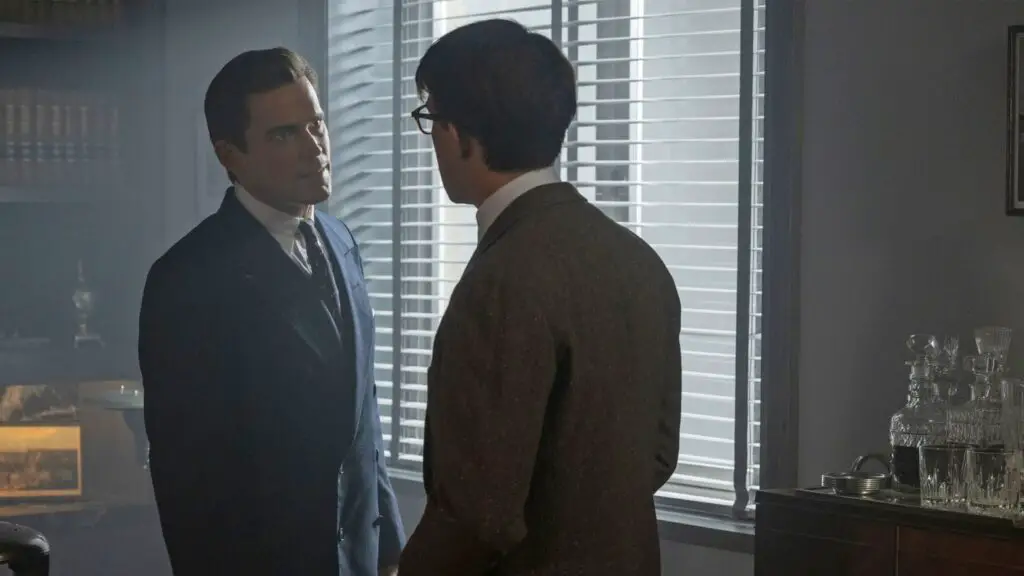Episode 5 of “Fellow Travelers,” titled “Promise You Won’t Write,” presents a complex tapestry of political intrigue and personal turmoil. The episode is set against the historic Army-McCarthy hearings, a period marked by heightened political tension and personal vendettas. Roy Cohn’s obsession with David Schine escalates, leading to a national scandal that threatens to unravel the lives of all involved.
As the hearings progress, Senator Smith finds himself under attack from McCarthy’s allies, who threaten to expose deep family secrets. This development creates a volatile environment, where political battles and personal demons collide. Hawk, a central character grappling with his own secret life, attempts to shield Senator Smith from the fallout. Meanwhile, Hawk’s relationship with Lucy, Senator Smith’s daughter, faces its own set of challenges, as a tragedy unexpectedly brings them closer.
The episode also delves into the struggles of Marcus, another key character torn between his love for Frankie and a burgeoning career at the Post. His dilemma reflects the broader theme of personal sacrifice in the pursuit of ambition, a recurring motif in the series.
Tim, exposed to the true natures of both McCarthy and Hawk, faces a critical decision about his future. His journey throughout the episode encapsulates the overarching theme of the series: the search for identity and purpose in a world rife with conflict and contradiction.
This episode of “Fellow Travelers” stands out for its intricate storytelling and character development. It skillfully intertwines historical events with fictional narratives, creating a rich and emotionally charged viewing experience. The portrayal of characters struggling with their ideals, desires, and fears against the backdrop of a pivotal moment in American history makes this episode a standout in the series.
The narrative of Episode 5 is a testament to the show’s ability to blend historical accuracy with compelling drama. It serves as a mirror to the era it represents, reflecting the complexities and moral ambiguities of the time. The episode’s focus on the personal ramifications of political actions adds depth and nuance to the historical narrative, making it not just a story about a specific time in history, but a timeless exploration of human nature and societal dynamics.
In conclusion, “Promise You Won’t Write” is a powerful episode that captures the essence of “Fellow Travelers” as a series. It challenges viewers to contemplate the impact of history on personal lives and the often-painful choices individuals must make in the face of sweeping societal change. The episode is a poignant reminder of the enduring relevance of historical events and their ability to shape our understanding of the present.
The Human Cost of Political Warfare: Unraveling the Emotional Layers of Episode 5

The fifth episode of “Fellow Travelers” not only illuminates the political landscape of the era but also delves deep into the emotional and psychological toll it takes on its characters. The episode masterfully showcases the human cost of political warfare, as the characters navigate a world where personal and political realms are inextricably intertwined.
At the heart of the episode is the poignant depiction of Hawk’s struggle. His efforts to protect Senator Smith from political adversaries while simultaneously concealing his true identity from Lucy spotlight the internal conflict many face when personal truths clash with public personas. This duality is further complicated by a tragic event that brings Hawk and Lucy closer, adding layers of complexity to their relationship.
Meanwhile, Marcus’s story arc presents a relatable dilemma: the choice between personal happiness and professional success. His torn allegiance between his love for Frankie and his career aspirations at the Post resonates with viewers who have faced similar crossroads. This subplot adds a universal appeal to the episode, connecting historical events to contemporary themes of love, ambition, and sacrifice.
Tim’s character development is particularly noteworthy in this episode. Faced with the harsh realities of McCarthy’s ruthlessness and Hawk’s duplicity, Tim’s journey is a compelling exploration of self-discovery and moral awakening. His decisions reflect the struggles of many who find themselves at a crossroads, forced to choose between compromising their values or standing up for what they believe in.
The episode’s portrayal of the Army-McCarthy hearings serves as a powerful backdrop, highlighting the era’s political paranoia and the devastating impact it had on individuals’ lives. The intertwining of these historical events with the personal stories of the characters adds depth to the narrative, making the episode not just a historical recount but a poignant study of human resilience and vulnerability.
In sum, Episode 5 of “Fellow Travelers” is a masterful blend of historical drama and deep emotional storytelling. It captures the essence of an era while providing a timeless commentary on the human condition. The episode’s ability to weave together the political and personal with such finesse makes it a standout in the series, offering viewers a profound and moving experience.


